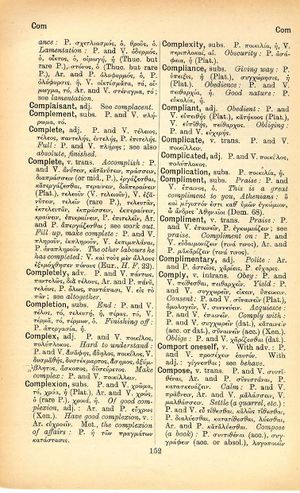complex: Difference between revisions
From LSJ
Κρεῖττον τὸ μὴ ζῆν ἐστιν ἢ ζῆν ἀθλίως → Death is better than a life of misery → Satius mori quam calamitose vivere → Der Tod ist besser als ein Leben in der Not
(CSV3) |
(6_4) |
||
| Line 7: | Line 7: | ||
<b class="b2">Make complex</b>: P. and V. ποικίλλειν. | <b class="b2">Make complex</b>: P. and V. ποικίλλειν. | ||
}} | |||
{{Lewis | |||
|lshtext=<b>complex</b>: plĭcis, adj. [[complico]],<br /><b>I</b> [[closely]] [[connected]] [[with]] one, [[confederate]], [[participant]] ([[late]] Lat.): dii [[consentes]] et complices, i. e. agreeing, Arn. 3, p. 123 (v. [[consentes]]).— With gen., Cod. Th. 6, 4, 21; Ambros. Off. 3, 4; Prud. Ham. 614. | |||
}} | }} | ||
Revision as of 08:26, 13 August 2017
English > Greek (Woodhouse)
adj.
P. and V. ποικίλος, πολύπλοκος.
Hard to understand: P. and V. ἀσαφής, ἄδηλος, ποικίλος, V. δυσμαθής, δυστέκμαρτος, ἄσημος, ἀξύμβλητος, ἄσκοπος, δυσεύρετος.
Make complex: P. and V. ποικίλλειν.
Latin > English (Lewis & Short)
complex: plĭcis, adj. complico,
I closely connected with one, confederate, participant (late Lat.): dii consentes et complices, i. e. agreeing, Arn. 3, p. 123 (v. consentes).— With gen., Cod. Th. 6, 4, 21; Ambros. Off. 3, 4; Prud. Ham. 614.

